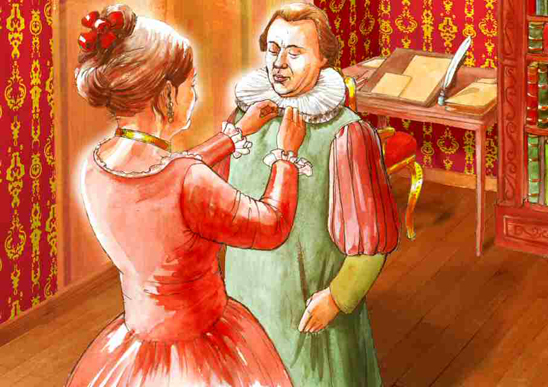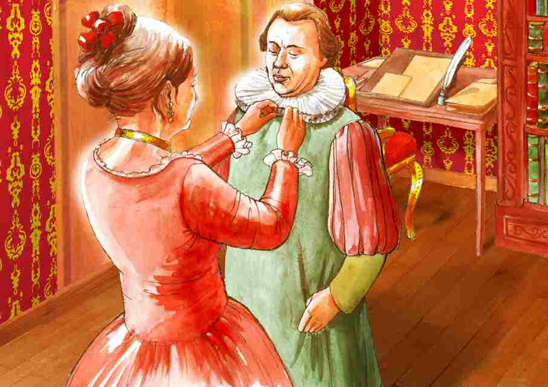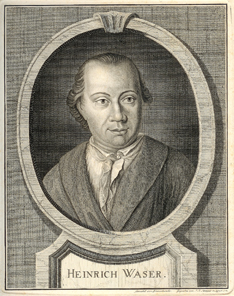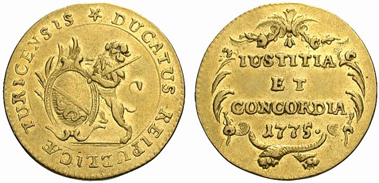The People of Zurich and their Money 10: The Troublemaker
by courtesy of MoneyMuseum
Our series “The People of Zurich and their Money” takes you along for the ride as we explore the Zurich of times past. Today, you will get to know Minister Waser, a know-it-all and troublemaker who made himself a lot of enemies with all his fierce accusations. Much like a good DVD, this conversation comes with a sort of “making of” – a little numismatic-historical backdrop to underscore and illustrate this conversation.
April 18, 1773. Cleophea Waser, née Scheuchzer, helps her husband Johann Heinrich Waser to get ready for the sermon. Drawn by Dani Pelagatti / Atelier bunterhund. Copyright MoneyMuseum Zurich.
Johann Heinrich Waser: (in a very good humor, the text nearly singing like an incantation) If we’ve to see now, that Ananias and Saphira who stole only a trifle of the communal property and the relief fund, died immediately at the feet of the servant of god, if we’ve to see now…
Cleophea Waser: (interrupts him) Do you really think, that you should do it?
What do you mean?
I think of this sermon on the embezzled communal property. You only make enemies.
Why? Every reasonable person has at least to some extent to accept that it’s a shameful injustice how the authorities have embezzled our communal property.
Oh Johann Heinrich, what, after all, that’s happened?
What has happened? You dare to ask? Our God-given authorities haven’t collected the taxes to which they were entitled. The treasury let slip 157 pounds.
157 pounds? Johann Heinrich, that’s less than you earn in half a year. This money doesn’t warrant all the trouble.
Cleophea, there’s a principle at stake. Who isn’t correct on a small scale, will fail on a large scale. I hate them, these men who always excuse their failure by telling that it’s “almost” correct! Everybody will be able to become “almost” a Christ, if he hears a good sermon once in his life. Everybody will be able to become “almost” a professor, if he leafs through a book at times. I don’t care for “almost”. I want everything to be perfectly correct.
That’s not your task, Johann Heinrich. Here you are only the parson.
Who care’s if I don’t? And if all the world closed its eyes, then at least one would have to guard.
No, Johann Heinrich, that’s not right. Our authorities are responsible for everything taking the right course. You were right to call their attention to the mistake. But it was them who had to sentence the culprits. What they did in the end.
Oh this den of iniquity! The subbailiffs were to pay a fine of 24 pound plus 4 pounds for dues. And these impious officials took the fine from the relief fund. And this I’ll expose in my sermon. (in the style of a sermon) If we’ve to see now, that Ananias and Saphira who stole only a trifle of the communal property and the relief fund, died immediately at the feet of the servant of god, who will be so barking mad to commit a sin on purpose?
I’m afraid, Johann Heinrich, if you continue like that, they’ll remove you from your office in the end. And what shall we do then?
Johann Heinrich Waser, by J. R. Holzhalb nach Brunschweiler. Source: Wikipedia.
Making of:
In all probability, Johann Heinrich Waser (*1742, †1780) is the most colorful figure the enlightenment in Zurich has witnessed. Admittedly, he possessed ingenious features: he united extraordinary mathematical skills and enormous diligence with unscrupulousness and scorn for any kind of authority. Plus, he could be quite malicious and argumentative. Waser dedicated all these characteristic features to something we would call investigative journalism today. On his own initiative, he checked the bookkeeping of the several offices in Zurich in regard to income and expense and met more than one thing that was in sixes and sevens, particularly regarding clarity and exactness. When he faulted that, he acted so pushily that he made himself more than one enemy. And he was no chooser as to the means he applied in order to put somebody in the pillory.
It is the end of Waser’s life that is known best. He had published an article on a part of the Zurich treasure, more precisely on the war fund, with Schlözer in Göttingen. The publisher had added a footnote in which he accused the city fathers of embezzlement and corruptibility. The authorities in Zurich, however, weren’t willing to let that go unchallenged. The publisher of this subversive pamphlet was beyond reach. The author, in contrast, was debunked quickly. Waser was arrested. In addition, during a house search it became apparent that Waser had stolen books, records and precious engravings from all important libraries and archives for years, including a politically charged document that specified the original terms by which the House of Habsburg had pledged the Kyburg County to the city of Zurich in 1452. After a trial of two months, Waser was sentenced to death. On May 27, 1780, he was decapitated.
Our audio drama, however, isn’t concerned with the famous death of this controversial figure, but deals with the beginnings of his career as critic of the Zurich authorities. Already on his first public appearance, he proved to be quite good at figures, to be all too willing to delve into the tax accounting of the Zurich administration and name and shame possible mistakes or even inaccuracies. On September 23, 1770, 28-year-old Johann Heinrich Waser was appointed minister of Heilig Kreuz, a small flock with 3000 members, including the parishes of Hottingen, Hirslanden and Riesbach. Waser didn’t content himself with pastoring. Soon, he began to go through the parish’s bills – and caused amazement with the untervögte (minor reeves) who actually were the ones responsible for the administration. As a matter of fact, Waser encountered discrepancies in regard to the so-called hintersassengelder, i.e. the taxes those inhabitants were obliged to pay who didn’t possess the Zurich citizenship. These statements were completely missing in the records. Waser notified the obervögte (major reeves) whose duty it was to check the untervögte. They looked into the matter and verified Waser’s accusations – the ones responsible were fined 24 pfund, hence 480 shillings. According to the kind of profession, that equaled 14 to 48 daily wages, hence a considerable sum. Because it was not entirely the untervögte’s fault – the hintersassengelder hadn’t been levied for decades –, the obervögte decided that the fine of the untervögte were to paid from the parish’s purse. The shortcoming was remedied, the chancery compiled a new hintersassen-record and the debt due, 157 pfund, was collected.
Zurich. Ducat 1775. From auction sale Münzen und Medaillen Deutschland GmbH 27 (2008) 2641.
But: the quarrelsome minister wasn’t content with that. He really disliked that the public chest had paid the fine of the untervögte whereas the two ‘guilty ones’ had gone unpunished in his view. He felt that the authorities had been sloppy. So, Waser tried to make them admit their failure. How convenient for him that, during a meeting he had summoned, three of the community’s notables committed acts of violence. The justice of peace fined the ones responsible 10 pfund each. Waser paid this penalty from his own purse and reclaimed his expenses from the public chest.
Waser constantly interfered in administrative matters of the community, but: often he had every reason to do so. In one instance he proceeded against a landlord who had violated the rigid moral laws. The untervogt investigated the case, the landlord was filed. But: Waser considered the penalty too mild. He brought a second action, but this time the court rebuffed him.
Generally speaking, Waser was right by law, but the means he used to enforce his accusations often contradicted any kind of Christian charity. Thanks to his office as a minister he was able to manipulate public opinion. When ascending the pulpit, he made ample use of that. The doggedness with which he moved in on alleged injustices in regard to the hintersassengelder culminated in the sermon from April 18, 1773, and this is also the point of departure of our little audio drama.
For his sermon he had chosen a paragraph of the Acts of the Apostles which he read in his own way: “If we’ve to see now, that Ananias and Saphira who stole only a trifle of the communal property and the relief fund, died immediately at the feet of the servant of god, who will be so barking mad to commit a sin on purpose?” Of course, the Old Testament never refers to property belonging to the community and the poor!
It wasn’t that sermon, though, that lost Waser his office – the final blow was a letter he wrote to the alms office on October 12, 1773, where he addressed the tiresome hintersassen-subject yet another time. The response has come down to us – it runs to 30 (!) folio pages. The obervögte used the opportunity to turn the table and complain about the bickerer, they demanded that the mutual accusations were investigated. After four meetings in a committee that was installed solely for that purpose, Waser was stripped of his office.
Already in the early stage of his ‘career’ as critic of the Zurich administration, Waser had presented himself as trouble-maker and know-it-all, like the ones you can still find. Of course, he thought different. In his introduction to the ‘Historical-diplomatic jahrzeitbuch’ (book of the yearly commemoration services) Waser wrote a kind of personal confession of faith of which our audio drama gives the gist. It reads: “The major part of the humans living on earth is content with a simple ‘almost’ in almost everything they do. Rare are those people who are exactly what they pretend to be. The reason is quite simple, since one has least trouble and danger when an ‘almost’ is sufficient. Almost a Christian becomes he who listens to a good sermon once in his lifetime, almost a scholar he who browses through books long enough, almost an honorable man he who is the least bit careful not to become an all too wicked villain, almost a philanthropist he who is no apparent evildoer and brigand (…). But to be what you ought to be, wholeheartedly, that is so much more difficult (…). You only rarely meet a man who is honorable and determined, who has the guts to break through and overcome all obstacles. And of these few one or two become victim of almost state prudence, almost justice, almost patriotism. Almost – almost – since pretty much everything in this world is just almost.”
With the upcoming episode we will leave Switzerland and listen to Leonhard Ziegler, successful Zurich citizen, in India: “Ziegler – the soldier millionaire, who would not know him?”
You can find all other parts of the series here.
The texts and graphics come from the brochure of the exhibition of the same name in the MoneyMuseum, Zurich. Excerpts with sound are available as video here.








